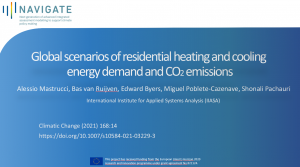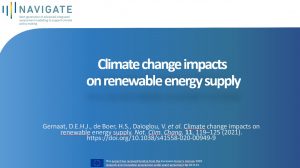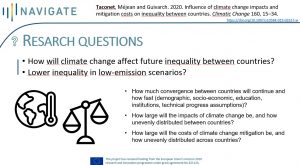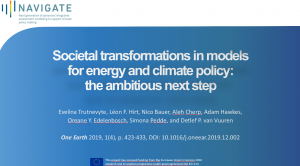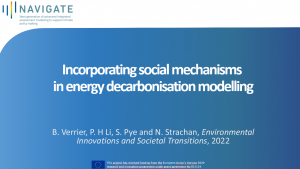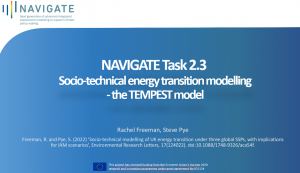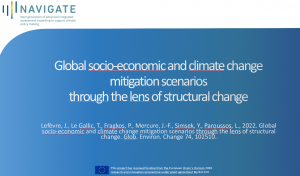NAVIGATOR: A toolbox for accessing IAM resources and results developed during the course of the project. The objective of the IAM NAVIGATOR is to foster uptake of IAM advances and new policy insights by users, experts in related fields, and the IAM community itself.
It contains three main sections:
Publications and slide decks
Decarbonization in different sectors

Buildings

Bezerra, P., da Silva, F., Cruz, T., Mistry, M., Vasquez-Arroyo, E., Magalar, L., De Cian, E., Lucena, A.F.P., Schaeffer, R. (2021) Impacts of a warmer world on space cooling demand in Brazilian households. Energy and Buildings, 234, https://doi.org/10.1016/j.enbuild.2020.110696
Levesque, A. et al (2021) Deep decarbonisation of buildings energy services through demand and supply transformations in a 1.5°C scenario. Environ. Res. Lett. 16 054071
Mastrucci, A., van Ruijven, B., Byers, E., Poblete-Cazenave, M., Pachauri, S. (2021) Global scenarios of residential heating and cooling energy demand and CO2 emissions, Climatic Change, 168, 10.1007/s10584-021-03229-3
Edelenbosch, O.Y., Rovelli, D., Levesque, A., Marangoni, G., Tavoni, M. (2021) Long term, cross-country effects of buildings insulation policies, Technological Forecasting and Social Change, Volume 170, https://doi.org/10.1016/j.techfore.2021.120887
Fotiou, T., Capros, P., Fragkos, P. (2022) Policy Modelling for Ambitious Energy Efficiency Investment in the EU Residential Buildings. Energies, 15, 2233. https://doi.org/10.3390/en15062233
Mastrucci, A., Byers, E., Pachauri, S. et al. (2022) Cooling access and energy requirements for adaptation to heat stress in megacities. Mitig Adapt Strateg Glob Change 27, 59, https://doi.org/10.1007/s11027-022-10032-7
Transport

Müller-Casseres, E., Carvalho, F., Nogueira, T., Fonte, C., Império, M., Poggio, M., Wei, H.K., Portugal-Pereira, J., Rochedo, P.R.R., Szklo, A., Schaeffer, R. (2020) Production of alternative marine fuels in Brazil: An integrated assessment perspective. Energy. Volume 219. Doi: 10.1016/j.energy.2020.119444
Rottoli, M., Dirnaichner, A., Pietzcker, R., Schreyer, F., Luderer, G. (2021) Alternative electrification pathways for light-duty vehicles in the European transport sector, Transportation Research Part D: Transport and Environment, Volume 99, https://doi.org/10.1016/j.trd.2021.103005
Carvalho, F. Müller-Casseres, E. Poggio, M. et al. (2021) Prospects for carbon-neutral maritime fuels production in Brazil, Journal of Cleaner Production, Vol 326, https://doi.org/10.1016/j.jclepro.2021.129385
Carvalho F, Portugal-Pereira J, Junginger M, Szklo A. (2021) Biofuels for Maritime Transportation: A Spatial, Techno-Economic, and Logistic Analysis in Brazil, Europe, South Africa, and the USA. Energies 14(16):4980. https://doi.org/10.3390/en14164980
Müller-Casseres, E., Edelenbosch, O.Y., Szklo, A., Schaeffer, R., van Vuuren, D.P. (2021) Global futures of trade impacting the challenge to decarbonize the international shipping sector, Energy, Vol 237, https://doi.org/10.1016/j.energy.2021.121547
Morfeldt, J., Johansson, D.J.A. (2022) Impacts of shared mobility on vehicle lifetimes and on the carbon footprint of electric vehicles. Nat Commun 13, 6400, https://doi.org/10.1038/s41467-022-33666-2
Maurício Aguilar Nepomuceno de Oliveira, Szklo, A., Castelo Branco, D.A. (2022) Implementation of Maritime Transport Mitigation Measures according to their marginal abatement costs and their mitigation potentials, Energy Policy, Vol. 160, https://doi.org/10.1016/j.enpol.2021.112699
Müller-Casseres et al. (2022) Are there synergies in the decarbonization of aviation and shipping? An integrated perspective for the case of Brazil. iScience 25, 105248, https://doi.org/10.1016/j.isci.2022.105248
Yeh, S. et al (2022) Improving future travel demand projections: a pathway with an open science interdisciplinary approach, Progress in Energy 4, https://doi.org/10.1088/2516-1083/ac86b5
Y. Liao, K. Ek, E. Wennerberg, S. Yeh and J. Gil (2022) A Mobility Model for Synthetic Travel Demand From Sparse Traces, in IEEE Open Journal of Intelligent Transportation Systems, vol. 3, pp. 665-678, 10.1109/OJITS.2022.3209907
Oliveira Fiorini, A.C. et al (2023) Sustainable aviation fuels must control induced land use change: an integrated assessment modelling exercise for Brazil, Environmental Research Letters, Volume 18, Number 1, 10.1088/1748-9326/acaee1
Fragkos, P. (2022) Decarbonizing the International Shipping and Aviation Sectors. Energies, 15, 9650. https://doi.org/10.3390/en15249650
Zanon-Zotin, M. et al. (2023) Unpacking bio-based alternatives to ethylene production in Brazil, Europe, and the United States: A comparative life cycle assessment. Journal of Cleaner Production, 10.1016/j.jclepro.2023.139376
Industry

Madeddu, S., Ueckerdt, F., Pehl, M., Peterseim, J., Lord, P., Ajith Kumar, K., Krüger, C., Luderer, G. (2020) . The CO2 reduction potential for the European industry via direct electrification of heat supply (power-to-heat). Environ. Res. Lett. 15 124004. https://doi.org/10.1088/1748-9326/abbd02
Oliveira, C.C.N. De, Zotin, M.Z., Rochedo, P.R.R., Szklo, A., (2020) Achieving negative emissions in plastics life cycles through the conversion of biomass feedstock. Biofuels, Bioprod. Bioref. https://doi.org/10.1002/bbb.2165
van Sluisveld, M.A.E., et al. (2021) A race to zero – Assessing the position of heavy industry in a global net-zero CO2 emissions context, Energy and Climate Change, Volume 2, https://doi.org/10.1016/j.egycc.2021.100051
Fragkos P., Fragkiadakis. K.. Paroussos, L. (2021) Reducing the Decarbonisation Cost Burden for EU Energy-Intensive Industries, Energies, 14, 236. https://doi.org/10.3390/en14010236
Fragkos, P. (2022) Analysing the systemic implications of energy efficiency and circular economy strategies in the decarbonisation context. AIMS Energy, 10(2): 191-218. doi: 10.3934/energy.2022011
Pye, S. Welsby, D., McDowall, W., et al. (2022) Regional uptake of direct reduction iron production using hydrogen under climate policy, Energy and Climate Change, https://doi.org/10.1016/j.egycc.2022.100087
Cimpan, C. et al. (2023) Effects of Circularity Interventions in the European Plastic Packaging Sector. Environmental Science & Technology. 10.1021/acs.est.2c08202
Jiang, M. et al (2023) Material and Carbon Footprints of Machinery Capital. Environ. Sci. Technol. Vol. 57 Is. 5, 10.1021/acs.est.3c06180
Land use

Humpenöder, F., Karstens, K., Lotze-Campen, H., Leifeld, J., Menichetti, L., Barthelmes A. and Popp, A. (2020) Peatland protection and restoration are key for climate change mitigation. Environmental Research Letters, Volume 15, Number 10, https://doi.org/10.1088/1748-9326/abae2a
Hurtt, G. C., Chini, L., Sahajpal, R., Frolking, S., Bodirsky, B. L., Calvin, K., Doelman, J. C., Fisk, J., Fujimori, S., Klein Goldewijk, K., Hasegawa, T., Havlik, P., Heinimann, A., Humpenöder, F., Jungclaus, J., Kaplan, J. O., Kennedy, J., Krisztin, T., Lawrence, D., … Zhang, X. (2020). Harmonization of global land use change and management for the period 850–2100 (LUH2) for CMIP6. Geoscientific Model Development, 13(11), 5425–5464. https://doi.org/10.5194/gmd-13-5425-2020
Frank, S., Gusti, M. Havlík, P. Lauri, P., Di Fulvio, F. Forsell, N., Hasegawa, T. Krisztin, T., Palazzo, A., Valin, H. (2021) Land-based climate change mitigation potentials within theagenda for sustainable development. Environmental Research Letters 16. https://doi.org/10.1088/1748-9326/abc58a
Searchinger, T., Zionts, J., Peng, L., Wirsenius, S., Beringer T. and Dumas, P. (2021) A Pathway to Carbon Neutral Agriculture in Denmark. World Resources Institute. https://files.wri.org/d8/s3fs-public/2021-05/carbon-neutral-agriculture-denmark.pdf?VersionId=LRoNzLYZUZW1qHDMm3yMdgtefm5O2PRj
Humpenöder, F., Bodirsky, B.L., Weindl, I. et al. (2022) Projected environmental benefits of replacing beef with microbial protein. Nature 605, 90–96. https://doi.org/10.1038/s41586-022-04629-w
Mishra, A., Humpenöder, F., Churkina, G. et al. (2022) Land use change and carbon emissions of a transformation to timber cities. Nature Communication 13. https://doi.org/10.1038/s41467-022-32244-w
Fujimori, S., Wu, W., Doelman, J. et al. (2022) Land-based climate change mitigation measures can affect agricultural markets and food security. Nat Food 3, 110–121. https://doi.org/10.1038/s43016-022-00464-4
Wu, Y., Deppermann, A., Havlík, P. et al. (2023) Global land-use and sustainability implications of enhanced bioenergy import of China, Applied Energy, Volume 336, https://doi.org/10.1016/j.apenergy.2023.120769
Ren, M., Huang, C., Wu, Y. et al. Enhanced food system efficiency is the key to China’s 2060 carbon neutrality target. Nat Food 4, 552–564 (2023). https://doi.org/10.1038/s43016-023-00790-1
Frank, S. et al. (2021) How much multilateralism do we need? Effectiveness of unilateral agricultural mitigation efforts in the global context. Environmental Research Letters, 10.1088/1748-9326/ac2967
Lifestyles

Agnew, M., Pettifor, H., Wilson, C. (2020) Lifestyles in Public Health, Marketing and Pro-Environmental Research. Tyndall Centre for Climate Change Research, Norwich, UK. Available here.
Eker, S, Garcia, D., Valin, H., van Ruijven, B. (2021) Using social media audience data to analyse the drivers of low-carbon diets. Environmental Research Letters, Vol. 16 No 7, https://doi.org/10.1088/1748-9326/abf770
Saujot, M., Le Gallic, T. and Waisman, H. (2021) Lifestyle changes in mitigation pathways: policy and scientific insights. Environmental Research Letters, Volume 16, Number 1. https://doi.org/10.1088/1748-9326/abd0a9
Springmann, M. et al. (2023) The global and regional air quality impacts of dietary change. Nature Communications, 10.1038/s41467-023-41789-3
Pettifor, H. (2023) Endogenous simulation of low-carbon lifestyle change in global climate mitigation pathways. Environmental Research Letters, 10.1088/1748-9326/acf6d6.
Pettifor, H. et al. (2023) A framework for measuring and modelling low-carbon lifestyles. Global Environmental Change. 10.1016/j.gloenvcha.2023.102739
Agnew, M.D. (2023) Lifestyle, an integrative concept: Cross-disciplinary insights for low-carbon research. WIRE´s Energy and Environment Vol. 12 Is. 6, 10.1002/wene.490
Climate change mitigation policies

Carbon pricing

Feindt, S. Kornek, U. et al. (2021) Understanding regressivity: Challenges and opportunities of European carbon pricing, Energy Economics, Volume 103, https://doi.org/10.1016/j.eneco.2021.105550
Garaffa, R., Cunha, B.S.L., Cruz, T. et al. (2021) Distributional effects of carbon pricing in Brazil under the Paris Agreement,
Energy Economics, Volume 101, https://doi.org/10.1016/j.eneco.2021.105396.
Budolfson M., Dennig F., Errickson F., Feindt S., Ferranna M., Fleurbaey M., Klenert D., Kornek U., Kuruc K., Méjean A., Peng W., Scovronick N., Spears D., Wagner F., Zuber S. (2021) “Climate action with revenue recycling has benefits for poverty, inequality, and wellbeing”, Nature Climate Change 11, 1111-1116 https ://doi.org/10.1038/s41558- 021-01217-0
Budolfson M., Dennig F., Errickson F., Feindt S., Ferranna M., Fleurbaey M., Klenert D., Kornek U., Kuruc K., Méjean A., Peng W., Scovronick N., Spears D., Wagner F., Zuber S. (2021) “Protecting the poor with a carbon tax and equal per capita dividend”, Nature Climate Change 11, 1025-1026, Policy Brief, https ://doi.org/10.1038/s41558- 021-01228-x
van der Ploeg F, Emmerling J, Groom B (2023) The social cost of carbon with intragenerational inequality and economic uncertainty. Centre for Climate Change Economics and Policy Working Paper 414/Grantham Research Institute on Climate Change and the Environment Working Paper 389. London: London School of Economics and Political Science. https://www.lse.ac.uk/granthaminstitute/wp-content/uploads/2023/01/working-paper-389-van-der-Ploeg-et-al.pdf
Andreoni, P., Aleluia Reis, L., Drouet, L. (2023) Fossil extraction bans and carbon taxes: Assessing their interplay through multiple models, iScience, Volume 26, ISSUE 4, 106377, April 21, 2023, https://doi.org/10.1016/j.isci.2023.106377
Carbon Dioxide Removal

Fyson, C.L., Baur, S., Gidden, M. et al. (2020) Fair-share carbon dioxide removal increases major emitter responsibility. Nature Climate Change, 10, 836–841. https://doi.org/10.1038/s41558-020-0857-2
Strefler, J. et al. (2021) Alternative carbon price trajectories can avoid excessive carbon removal. Nat Commun 12, 2264. https://doi.org/10.1038/s41467-021-22211-2
Fragkos, P. (2021) Assessing the Role of Carbon Capture and Storage in Mitigation Pathways of Developing Economies. Energies 2021, 14(7), 1879; https://doi.org/10.3390/en14071879.
Qiu, Y. (2022) Environmental trade-offs of direct air capture technologies in climate change mitigation toward 2100. Nature Communications
Renewable energy sources

Jaxa-Rozen, M., Trutnevyte, E. Sources of uncertainty in long-term global scenarios of solar photovoltaic technology. Nat. Clim. Chang. 11, 266–273 (2021). https://doi.org/10.1038/s41558-021-00998-8
Gernaat, D.E.H.J., de Boer, H.S., Daioglou, V. et al. (2021) Climate change impacts on renewable energy supply. Nature Climate Change 11, 119–125. https://doi.org/10.1038/s41558-020-00949-9
Luderer, G., Madeddu, S., Merfort, L. et al. (2022) Impact of declining renewable energy costs on electrification in low-emission scenarios. Nat Energy 7, 32–42. https://doi.org/10.1038/s41560-021-00937-z
Malik, A. and Bertram, C. (2022) Solar energy as an early just transition opportunity for coal-bearing states in India, Environ. Res. Lett. 17 034011, https://doi.org/10.1088/1748-9326/ac5194
Mitigation costs

van Vuuren, D.P., van der Wijst, K., Marsman, S. et al. The costs of achieving climate targets and the sources of uncertainty. Nat. Clim. Chang.10, 329–334 (2020). https://doi.org/10.1038/s41558-020-0732-1, access to online pdf: https://dspace.library.uu.nl/handle/1874/395401
Köberle, A.C., Vandyck, T., Guivarch, C. et al. (2021) The cost of mitigation revisited, Nature Climate Change, 11, pages 1035–1045, 10.1038/s41558-021-01203-6
Fair transition

Inequality

Taconet, N., A. Méjean, C. Guivarch. 2020. Influence of climate change impacts and mitigation costs on inequality between countries. Climatic Change. https://doi.org/10.1007/s10584-019-02637-w (online pdf access: https://rdcu.be/b2d1Z)
Fleurbaey, M., Méjean, A., Pottier, A., Zuber, S. (2020) The welfare implications of climate change-related mortality: Inequality and population ethics. halshs-03048370abe5d8
Emmerling, J. and Tavoni, M. (2021) Representing inequalities in integrated assessment modeling of climate change. One Earth Volume 4, Issue 2, 177-180. 10.1016/j.oneear.2021.01.013
Gazzotti, P., Emmerling, J., Marangoni, G. et al. (2021) Persistent inequality in economically optimal climate policies. Nat Commun 12, 3421. https://doi.org/10.1038/s41467-021-23613-y
Fragkos, P., Fragkiadakis, K., Sovacool, B., Paroussos, L., Vrontisi, Z., Charalampidis I. (2021) Equity implications of climate policy: Assessing the social and distributional impacts of emission reduction targets in the European Union, Energy, https://doi.org/10.1016/j.energy.2021.121591
Zheng, H., Wood, R., Moran, D et al. (2023) Rising carbon inequality and its driving factors from 2005 to 2015, Global Environmental Change, Volume 82, https://doi.org/10.1016/j.gloenvcha.2023.102704.
Employment

Pai, S., Emmerling, J., Drouet, L., Zerriffi, H., Jewell, J. (2021) Meeting well-below 2°C target would increase energy sector jobs globally, One Earth, Vol 4, Issue 7, 1026-1036, https://doi.org/10.1016/j.oneear.2021.06.005
Dasgupta, S., van Maanen, N., Gosling, S.N., Piontek, F., Otto, C., Schleussner, C.-F. (2021) Effects of climate change on combined labour productivity and supply: an empirical, multi-model study, The Lancet Planetary Health, Volume 5, Issue 7, https://doi.org/10.1016/S2542-5196(21)00170-4
Fragkos, P. and Fragkiadakis, K. (2022) Analyzing the Macro-Economic and Employment Implications of Ambitious Mitigation Pathways and Carbon Pricing, Frontiers in Climate Vol. 4, 10.3389/fclim.2022.785136
Shayegh, S. & Dasgupta, S. (2022) Climate change, labour availability and the future of gender inequality in South Africa, Climate and Development, 10.1080/17565529.2022.2074349
Sustainable development

Soergel, B., Kriegler, E., Bodirsky, B.L. et al. (2021) Combining ambitious climate policies with efforts to eradicate poverty. Nat Commun 12, 2342. https://doi.org/10.1038/s41467-021-22315-9
Soergel, B., Kriegler, E., Weindl, I. et al. (2021) A sustainable development pathway for climate action within the UN 2030 Agenda. Nat. Clim. Chang. 11, 656–664. https://doi.org/10.1038/s41558-021-01098-3
Kulkarni S, Hof A, Ambrósio G, Edelenbosch O, Köberle AC, et al. (2022) Investment needs to achieve SDGs: An overview. PLOS Sustainability and Transformation 1(7): e0000020. https://doi.org/10.1371/journal.pstr.0000020
Oliveira A.C., Rochedo, P. Angelkorte, G. et al. (2023) Investigating biodiversity trends in
different mitigation scenarios with a national integrated assessment model, Journal of
Integrative Environmental Sciences, 20:1, 2239323, DOI: 10.1080/1943815X.2023.2239323
Energy poverty

Pachauri, S., Poblete-Cazenave, M., Aktas, A. et al. (2021) Clean cooking access may stall under slow post-pandemic recovery and ambitious climate mitigation without explicit focus. Nature Energy 6, 1009–1010. https://doi.org/10.1038/s41560-021-00939-x
Poblete-Cazenave, M., Pachauri, S., Byers, E. et al. (2021) Global scenarios of household access to modern energy services under climate mitigation policy. Nat Energy 6, 824–833. https://doi.org/10.1038/s41560-021-00871-0
Pachauri, S., Poblete-Cazenave, M., Aktas, A., Gidden, M.J. (2021) Access to clean cooking services in energy and emission scenarios after COVID-19, Nature Energy, 10.1038/s41560-021-00911-9
Vandyck, T., Della Valle, N., Temursho, U. et al. (2023) EU climate action through an energy poverty lens. Sci Rep 13, 6040. https://doi.org/10.1038/s41598-023-32705-2
Fragkos, P. (2023) Energy Poverty and Just Transformation in Greece. In: Vulnerable Households in the Energy Transition, 10.1007/978-3-031-35684-1_10
Climate change impacts

Impacts of climate change

Piontek, S., Drouet, L.. Emmerling, J. et al. (2021) Integrated perspective on translating biophysical to economic impacts of climate change, Nature Climate Change, 11, pages 563–572, 10.1038/s41558-021-01065-y
Aleluia Reis, L., Drouet, L., Tavoni, M. (2022) Internalising health-economic impacts of air pollution into climate policy: a global modelling study. The Lancet Planetary Health, Vol 6, Issue 1, https://doi.org/10.1016/S2542-5196(21)00259-X
van der Wijst, KI., Bosello, F., Dasgupta, S. et al. (2023) New damage curves and multimodel analysis suggest lower optimal temperature. Nat. Clim. Chang. https://doi.org/10.1038/s41558-023-01636-1
Cassin, L., Mejean, A., Zuber, S. (2023) Go where the wind does not blow: Climate damages heterogeneity and future migrations, Working Papers 2023.02, FAERE – French Association of Environmental and Resource Economists. http://faere.fr/pub/WorkingPapers/Cassin_Mejean_Zuber_FAERE_WP2023.02.pdf
Bauer, N., Keller, D.P., Garbe, J. et al (2023) Exploring risks and benefits of overshooting a 1.5 °C carbon budget over space and time, Environ. Res. Lett. 18 054015, 10.1088/1748-9326/accd83
Impacts of COVID-19

Impacts of COVID-19 and green recovery

Johannes Emmerling, Kostas Fragkiadakis, Panagiotis Fragkos, Ramona Gulde, Elmar Kriegler, Jean-Francois Mercure, Bas van Ruijven, Yeliz Simsek, Massimo Tavoni, Charlie Wilson (2020) Impacts of COVID-19 and recovery packages on climate change mitigation action. NAVIGATE policy brief. https://www.navigate-h2020.eu/wp-content/uploads/2021/04/Impacts-of-COVID-19-and-recovery-packages-on-climate-change-mitigation-First-results-from-NAVIGATE.pdf
Emmerling J., Furceri D., Libano Monteiro F., Loungani P., Ostry J., Pizzuto P., and M. Tavoni (2021) Will the Economic Impact of COVID-19 Persist? Prognosis from 21st Century Pandemics, IMF Working Paper, https://www.imf.org/en/Publications/WP/Issues/2021/04/30/Will-the-Economic-Impact-of-COVID-19-Persist-Prognosis-from-21st-Century-Pandemics-50288
Rochedo, P.R.R., Fragkos, P., Garaffa, R. Caiado Couto, L., Baptista, L.B., Cunha, B., Schaeffer, R. & Szklo, A. (2021) Is Green Recovery Enough? Analysing the Impacts of Post-COVID-19 Economic Packages. Energies, 14(17), 5567; https://doi.org/10.3390/en14175567
Kikstra, J., Vinca, A., Francesco Lovat, F. (2021) Climate mitigation scenarios with persistent COVID-19-related energy demand changes, Nature Energy, 10.1038/s41560-021-00904-8
Wilson, C. & van Ruijven, B. (2021) Long-term impacts of COVID-19 on energy use in transport and buildings. NAVIGATE project. https://pure.iiasa.ac.at/id/eprint/17191/
Dafnomilis, I., Chen H-H., den Elzen, M., Fragkos P., et al. (2022) Targeted Green Recovery Measures in a Post-COVID-19 World Enable the Energy Transition, Frontiers in Climate, Vol. 4, 10.3389/fclim.2022.840933
Improving models

Integrated Assessment Models

Keppo, I., Butnar, I., Bauer, N. et al. (2021) Exploring the possibility space: Taking stock of the diverse capabilities and gaps in integrated assessment models. Environmental Research Letters. doi.org/10.1088/1748-9326/abe5d8
Harmsen, M. et al (2021) Integrated assessment model diagnostics: key indicators and model evolution. Environ. Res. Lett. 16 054046. https://doi.org/10.1088/1748-9326/abf964
Baumstark, L., Bauer, N., Benke, F., et al (2021) REMIND2.1: transformation and innovation dynamics of the energy-economic system within climate and sustainability limits, Geosci. Model Dev., 14, 6571–6603, https://doi.org/10.5194/gmd-14-6571-2021
Guivarch, C., Le Gallic, T., Bauer, N. et al. (2022) Using large ensembles of climate change mitigation scenarios for robust insights. Nature Climate Change 12, 428–435. https://doi.org/10.1038/s41558-022-01349-x
Socio-technical energy transition modelling

Trutnevyte, E., Hirt, L.F., Bauer, N., Cherp, A., Hawkes, A., Edelenbosch, O.A., Pedde, S., van Vuuren, D.P. (2019) Societal Transformations in Models for Energy and Climate Policy: The Ambitious Next Step, One Earth, Volume 1, Issue 4, 20 December 2019, Pages 423-433, https://doi.org/10.1016/j.oneear.2019.12.002
Verrier, B., Li P.H., Pye, S., Strachan, N. (2022) Incorporating social mechanisms in energy decarbonisation modelling, Environmental Innovation and Societal Transitions, Volume 45, 154-169, https://doi.org/10.1016/j.eist.2022.10.003
Freeman, R. & Pye, S. (2022) Socio-technical modelling of UK energy transition under three global SSPs, with implications for IAM scenarios, Env. Res. Letters, 17, 10.1088/1748-9326/aca54f
Li, PH (2023) Revealing effective regional decarbonisation measures to limit global temperature increase in uncertain transition scenarios with machine learning techniques. Climatic Change Vol. 176 No 7, 10.1007/s10584-023-03529-w
Shared Socioeconomic Pathways

Andrijevic, M.; Byers, E.; Mastrucci, A.; Smits, J.; Fuss, S. (2021) Future cooling gap in shared socioeconomic pathways, Environmental Research Letters, Vol.16 No 9, 10.1088/1748-9326/ac2195
Shayegh, S., Emmerling, J., Tavoni, M. (2022) International Migration Projections across Skill Levels in the Shared Socioeconomic Pathways. Sustainability, 14, 4757. https://doi.org/10.3390/su14084757
Koch, J,. & Leimbach, M. (2023) SSP economic growth projections: Major changes of key drivers in integrated assessment modelling, Ecological Economics, Volume 206, 107751, https://doi.org/10.1016/j.ecolecon.2023.107751
Leimbach, M., Marcolino, M. & Koch, J. (2023) Structural change scenarios within the SSP framework, Futures, Volume 150, 103156, https://doi.org/10.1016/j.futures.2023.103156
Other publications

Publications on other topics

Bauer, N., Bertram, C., Schultes, A. et al. Quantification of an efficiency–sovereignty trade-off in climate policy. Nature 588, 261–266 (2020). https://doi.org/10.1038/s41586-020-2982-5
Huppmann D, Gidden MJ, Nicholls Z et al. (2021) pyam: Analysis and visualisation of integrated assessment and macro-energy scenarios [version 2; peer review: 3 approved]. Open Res Europe 2021, 1:74 (https://doi.org/10.12688/openreseurope.13633.2)
Nikas, A. Gambhir, A. Trutnevyte, E. et al. (2021) Perspective of comprehensive and comprehensible multi-model energy and climate science in Europe. Energy Volume 215, Part A. https://doi.org/10.1016/j.energy.2020.119153
Vinca, A., Riahi, K., Roew, A., Djilali, N. (2021) Climate-Land-Energy-Water Nexus Models Across Scales: Progress, Gaps and Best Accessibility Practices. Front. Environ. Sci., https://doi.org/10.3389/fenvs.2021.691523
Xexakis, G. & Trutnevyte, E. (2021) Empirical testing of the visualizations of climate change mitigation scenarios with citizens: A comparison among Germany, Poland, and France, Global Environmental Change Vol 70. https://doi.org/10.1016/j.gloenvcha.2021.102324
Marangoni, G., Lamontagne, J.R., Quinn, J.D. et al. (2021) Adaptive mitigation strategies hedge against extreme climate futures. Climatic Change 166, 37. https://doi.org/10.1007/s10584-021-03132-x
de Oliveira, C.C.N., Angelkorte, G., Rochedo, P.R.R. et al. (2021) The role of biomaterials for the energy transition from the lens of a national integrated assessment model. Climatic Change 167, 57, https://doi.org/10.1007/s10584-021-03201-1
Fisch-Romito, V., Guivarch, C., Creutzig, F., Minx, J.C., Callaghan, M.W. (2021) Systematic map of the literature on carbon lock-in induced by long-lived capital, Environmental Research Letters, Vol. 16, No. 5, 10.1088/1748-9326/aba660
Lefèvre, J., Le Gallic, T., Fragkos, P., Mercure, J-F., Simsek, Y., Paroussos, L. (2022) Global socio-economic and climate change mitigation scenarios through the lens of structural change, Global Environmental Change, Volume 74, 102510, https://doi.org/10.1016/j.gloenvcha.2022.102510.
den Elzen, M.G.J., Dafnomilis, I., Forsell, N. et al. (2022) Updated nationally determined contributions collectively raise ambition levels but need strengthening further to keep Paris goals within reach. Mitig Adapt Strateg Glob Change 27, 33. https://doi.org/10.1007/s11027-022-10008-7
Colelli, F.P., Emmerling, J., Marangoni, G. et al. (2022) Increased energy use for adaptation significantly impacts mitigation pathways. Nat Commun 13, 4964. https://doi.org/10.1038/s41467-022-32471-1
Sanders, M., Serebriakova, A., Fragkos, P. et al (2022) Representation of financial markets in macro-economic transition models—a review and suggestions for extensions, Environ. Res. Lett. 17, 10.1088/1748-9326/ac7f48
Kulkarni S, Hof A, Ambrósio G, Edelenbosch O, Köberle AC, et al. (2022) Investment needs to achieve SDGs: An overview. PLOS Sustainability and Transformation 1(7): e0000020. https://doi.org/10.1371/journal.pstr.0000020
Harmsen, M., Tabak, C., Höglund-Isaksson, L. et al. (2023) Uncertainty in non-CO2 greenhouse gas mitigation contributes to ambiguity in global climate policy feasibility. Nat Commun 14, 2949. https://doi.org/10.1038/s41467-023-38577-4
Drouet, L. et al. (2023) Net economic benefits of well-below 2°C scenarios and associated uncertainties. Oxford Open Climate Change, Vol. 2 Is. 1, 10.1093/oxfclm/kgac003
van Maanen, N. et al. (2023) Representation of adaptation in quantitative climate assessments. Nature Climate Change, 10.1038/s41558-023-01644-1
Hellweg, S. et al. (2023) Life-cycle assessment to guide solutions for the triple planetary crisis. Nature Reviews Earth & Environment, 10.1038/s43017-023-00449-2
Budzinski, M. et al. (2023) Coupling energy system models with multi-regional input-output models based on the make and use framework – insights from MESSAGEix and EXIOBASE. Economic Systems Research, 10.1080/09535314.2022.2158065
Synthesis report
The synthesis report of the NAVIGATE project presents policy relevant insights on how to achieve a rapid and fair transition to net zero emissions. It includes research results from various work streams of the project, such as decarbonisation of the industry, transport and buildings sector, and fairness considerations.
The report is available here.



